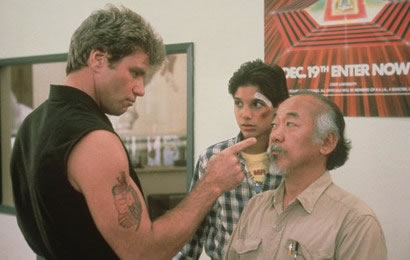In the 1984 movie The Karate Kid, a teenage boy becomes disheartened when his karate teacher has him doing chores to exhaustion day after day. Instead of teaching the boy fighting techniques for his upcoming competition, the master instructs the boy to paint his house and fence, sand his floors, and wax his many old cars. The boy listens to his teacher but eventually grows impatient and expresses strong negative feelings. When the master commands the boy to show him the moves the boy learned to complete the myriad of boring and laborious chores—sand the floor, wax on/wax off, paint the fence, and so on—the boy realizes that he was actually being trained all along. He is then able to easily learn the formal karate moves that he wants and needs for the competition.
I suppose the above movie scenario could be interpreted in different ways, but the take-home message for me is that committing to hard work leads to growth and success. Sure, the boy finally learned karate, but more importantly, he learned the importance of patience, delaying gratification, concentration, self-discipline, perseverance, being in the moment, and selflessness.
As loving parents, we want our children to grow up to be happy, and it’s natural to also want our children to do as well professionally, if not better, than we’ve done. Certainly, early academic and cultural enrichment opportunities, tutoring, and other after-school social, educational, and athletic activities can all contribute to our children’s happiness and success. But do we spend an equal amount of time teaching our children how to “wax on, wax off”?
Psychological/emotional resilience and grit are areas of study that developmental psychologists know to be important when it comes to a child’s later happiness and success in life. A child who possesses adequate psychological or emotional resilience can encounter significant challenges or adverse experiences and continue to develop well. And a child with grit will persevere toward long-term goals despite encountering obstacles along the way.
Some research has even found that psychological/emotional resilience and grit are as important as, if not more important than, having a high IQ. As a psychologist, I have witnessed this when some teenage clients of mine have been accepted and gone to four-year colleges but failed out of school within a short period of time. In these instances, the teenagers were smart enough to be at school—they earned the GPA and the SAT scores to get in—but they lacked the emotional resilience and grit to thrive once there.
Researchers believe that emotional resilience and grit develop in an unfolding process alongside specific factors like family support, community and social support, a positive self-concept, flexible communication and problem-solving skills, and the ability to manage strong feelings and impulses. Problems with emotional resilience and grit can start at a young age, but parents can help their children become emotionally strong and passionate about their lives and toward their pursuits. Whether your child is three, nine, or sixteen years of age, it’s never too late to help him or her become more resilient.
Here are nine helpful tips to consider:
- Teach your child the value of a dollar
- Give your child age appropriate chores
- Encourage your child to go beyond their comfort zone and to take risks
- Let your child scrape their knees and get dirty
- Send your child to an away camp
- Reward your child for hard work, good behaviors and accomplishments
- Praise your child’s efforts more than the outcome
- Encourage your child to be selfless and to do good deeds
- Model resilience for your child
At the end of The Karate Kid, the boy wins the competition, and he even wins over the girl he likes and the respect from some of the bullies in his life. That didn’t just happen to him by chance, but rather it happened because he pushed through his physically and emotionally upsetting and painful moments. Through perseverance and passion to be the best, he learned the importance of “wax on, wax off.”
Michael Oberschneider, Psy.D., is a clinical psychologist and the founder and director of Ashburn Psychological and Psychiatric Services. He has been featured as a mental-health expert on CNN, Good Morning America, and other popular media outlets. Dr. Oberschneider has also received Washingtonian Magazine’s “Top Therapist” honor for his work with children and adolescents. He lives in Leesburg, Virginia, with his wife Liz and two children, Ava and Otto.

